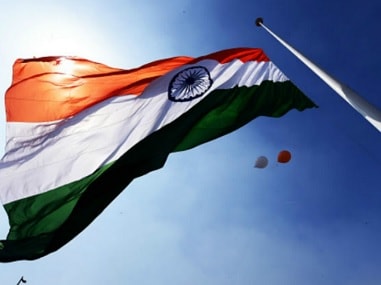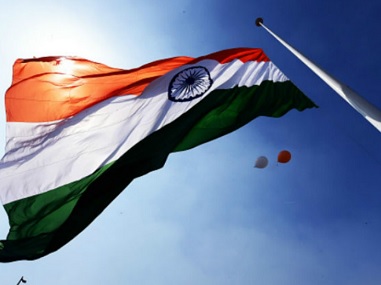As the post of Chief of Defence Staff (CDS) for Indian Armed Forces is set to materialise, write-ups have proliferated advocating a star-embedded, Leviathan size CDS with overarching powers. The office that was supposed to be ‘advisory’ is being advocated as ‘quite empowered’. The scholarly discussions held thus far miss out experiences of many developing countries having powerful military chiefs and the resultant hiccups for the democratic project. Unless we design a CDS with sufficient checks and balances, we would not be able to identify and plug the loopholes in India’s defence modernisation, mobilisation and war preparedness. [caption id=“attachment_7162831” align=“alignleft” width=“381”]  Indian National Flag. News18.[/caption] The institutional emergence of CDS comes against a challenging contextual environment. First, there is a yawning chasm in civil-military relations. For example, both sides are ignorant of each other’s perspectives on national security. Scholarly discourses on institutionalisation of CDS have been driven less by rational choice and more by organisational imperatives. The upcoming institution is seen as thumbs up moment for one side rather than genuine and commendable public policy step in defence reforms story. The CDS would have a steadfast job in ensuring that civil-military gap does not increase and there is no unnecessary militarisation of society, polity and economy. Second, at present, the defence secretary coordinates three service chiefs hitherto senior to him in the warrant of precedence. The addition of the fourth one, whether at four-star or five-star-level, may make his job more challenging. Will there be a conflict of interest between the CDS as ‘principal defence advisor’ and the defence secretary as ‘principal civilian advisor’? Will it lead to any erosion of the defence secretary as ‘Chief Accounting Authority’ in defence matters? Will the CDS render an advice contrary to one given by the defence secretary? These issues would need to be navigated. Third, India’s own joint command endeavours are in a fledgling stage. The Andaman Nicobar Tri Service Command experiment reveals that coordination among three services has a long way to go. The services guard their turfs rather vigorously and would not give up their pie easily for a joint endeavour in military operations. The CDS is only a small example of replacing resistance with consensus-based defence reforms and needs proliferation in all possible sectors such as war doctrines, training, and ultimately joint ‘theatre command system’. Much has been made of America’s Goldwater Nichols Act (1986) in pushing the CDS case. Yet, the protagonists forget that the Act was an afterthought of America’s many failed missions in different parts of world that necessitated ‘integrated theatre system’. While the Act did create a Joint Chief of Staff (JCS) as a single point military advice, theatre command chiefs report do not report to him, thus avoiding a concentration of military power. Also, the contemporary American scholarly community is divided about the benefits of Goldwater Nichols Act, putting it under review process, more so after recent setbacks in Afghanistan, Iraq and other geographical platforms. Therefore, blind replication of the US model or the recent ‘Chinese’ model may not be very helpful and requires careful re-calibration for Indian circumstances due to India’s unique third world security problems, weak institutional edifice, fragile civil-military relations and above all, limited geographical expanse. Similarly, much has been made of India’s war histories to plead for a CDS. However, there is no definite evidence to substantiate this hypothesis. The oft-quoted Kargil War occurred due to a multiplicity of factors and not solely because of an absence of a ‘single point military advice’. Perhaps the most logical justification for the CDS is its presence with variable powers in more than hundred countries. These include developed countries where civil-military relations are settled beyond doubt and democratic leadership is all-pervasive. However, experiences of many Afro-Asian countries do not engender confidence in CDS as an institution, often bringing into dispute its utilitarian role. We must, therefore, make the best of global experience while crafting our own CDS. Most write-ups advocate a CDS with five-star instead of four-star rank. Also, instead of advisory functions, they advocate wide-ranging operational powers for CDS, having full control over strategic forces, nuclear forces and proposed theatre commands. He would certainly have a dedicated schedule in the delegation of financial powers for defence services (DFPDS). Most importantly, he is being advocated as permanent invitee to the Cabinet Committee on Security (CCS). Some have advocated bringing paramilitary forces under his operational ambit! Such a blueprint might end up creating a Leviathan instead of ‘military advisor’. The difference between ‘single point of advice’ vs ‘single point of command’ has not been properly discussed. The latter is fatally powerful and akin to a Commander-in-Chief. Such an institution may be at loggerheads with the checks and balances spirit, encourage disproportionate military bureaucracy and may undermine democratic values. Finally, how do we ensure that the single point advice rendered by CDS to political leadership is based on rational and comprehensive analysis? At the end of the day, working culture in armed forces is highly dependent on the chief; his views become the organisational view. What if his advice is not in sync with national priorities? For example, if he were to advocate defence expenditure at three percent of GDP, how do we sensitise him about other pressing priorities? Will the CDS care for an affordable and cost effective defence expenditure or become mouthpiece of ‘the more, the better’ school of thought on defence expenditure? Will he be neutral in balancing the ‘defence vs development’ debate? These issues need consideration. The political initiative of CDS provides an opportunity for carrying forward the most ambitious defence reforms package in post-Independence period. Instead of frittering away our energies in debating a four-star or five-star CDS, we should discuss how to enable him to be a true defence ‘advisor’ respectful of our democratic structures, political leadership, and above all, capable of facilitating a cost effective and affordable defence for India. Bhartendu Kumar Singh is in the Indian Defence Accounts Service. Views are personal.
As the post of Chief of Defence Staff (CDS) for Indian Armed Forces is set to materialise, write-ups have proliferated advocating a star-embedded, Leviathan size CDS with overarching powers.
Advertisement
End of Article


)

)
)
)
)
)
)
)
)



